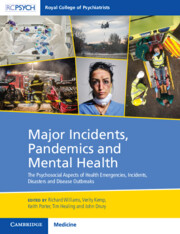 Major Incidents, Pandemics and Mental Health
Major Incidents, Pandemics and Mental Health from Section 4 - Responses to Meet the Mental Health Needs of People Affected by Emergencies, Major Incidents, and Pandemics
Published online by Cambridge University Press: 11 January 2024
The COVID-19 pandemic severely disrupted the educational and social lives of millions of children across the globe. Many governments attempted to curb the spread of the virus by closing schools or allowing them to remain open only for certain students, necessitating a rapid adjustment to remote home learning for schools and families. In the UK, this led to huge variability in the provision of educational materials, in children’s engagement, and in parents’ capacity to support home learning. This chapter describes the impacts of the school closures on families’ and students’ educational and socioemotional development.
To save this book to your Kindle, first ensure [email protected] is added to your Approved Personal Document E-mail List under your Personal Document Settings on the Manage Your Content and Devices page of your Amazon account. Then enter the ‘name’ part of your Kindle email address below. Find out more about saving to your Kindle.
Note you can select to save to either the @free.kindle.com or @kindle.com variations. ‘@free.kindle.com’ emails are free but can only be saved to your device when it is connected to wi-fi. ‘@kindle.com’ emails can be delivered even when you are not connected to wi-fi, but note that service fees apply.
Find out more about the Kindle Personal Document Service.
To save content items to your account, please confirm that you agree to abide by our usage policies. If this is the first time you use this feature, you will be asked to authorise Cambridge Core to connect with your account. Find out more about saving content to Dropbox.
To save content items to your account, please confirm that you agree to abide by our usage policies. If this is the first time you use this feature, you will be asked to authorise Cambridge Core to connect with your account. Find out more about saving content to Google Drive.